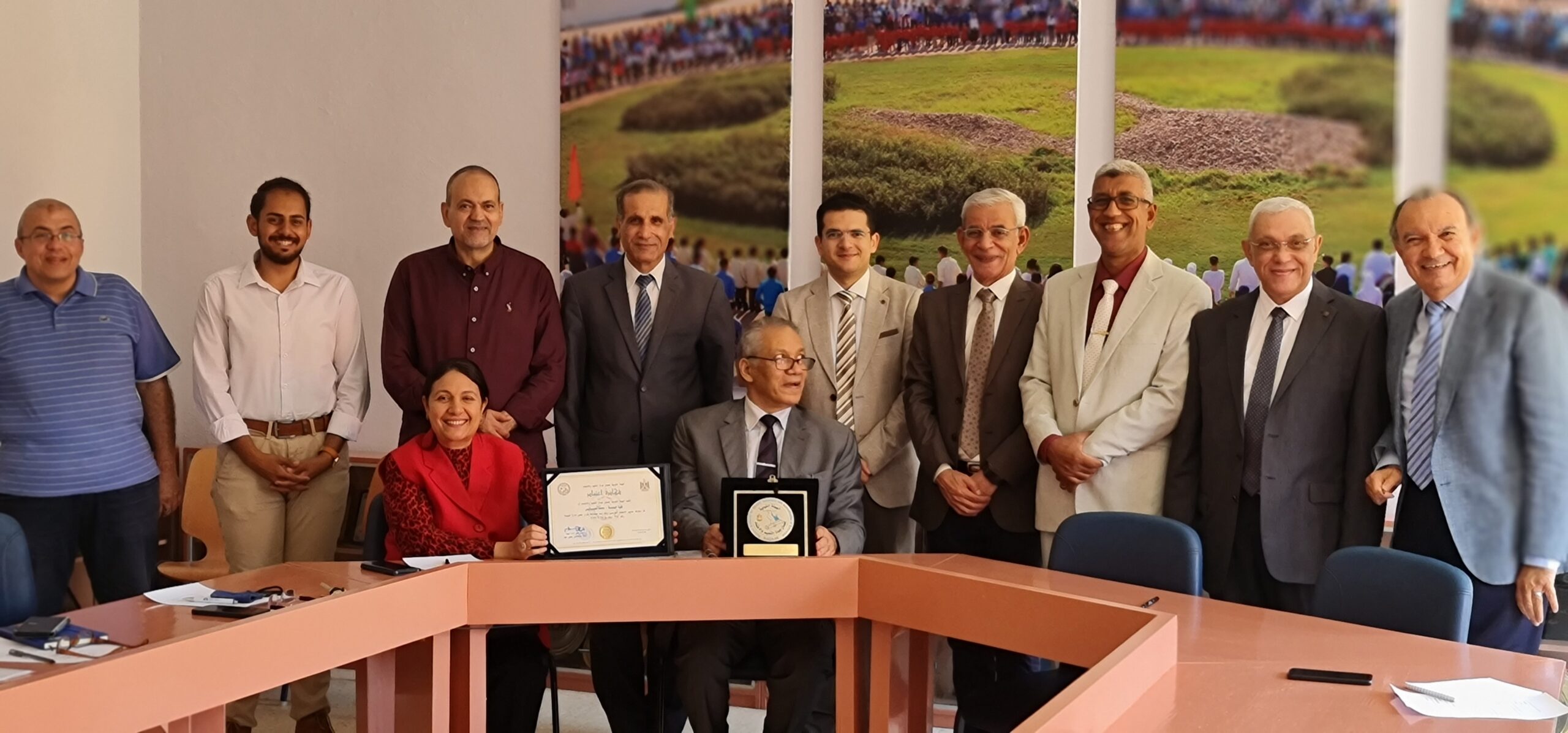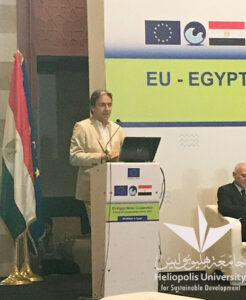
 Heliopolis University for Sustainable Development in coordination with the Ministry of Water Resources and Irrigation held a special session during Cairo Water Week that took place from 14-18 October. The session discussed issues related to water, food, and energy.
Heliopolis University for Sustainable Development in coordination with the Ministry of Water Resources and Irrigation held a special session during Cairo Water Week that took place from 14-18 October. The session discussed issues related to water, food, and energy.
The session was facilitated by Dr. Rasha Al-Kholy, Vice President of Heliopolis University and Dean of the Faculty of Engineering, Prof. Dr. Hani Sewilam – Director of UNESCO Water Chair, Head of Hydraulics Department at Aachen University, Germany, and Member of Heliopolis University Board of Trustees, Prof. Ayman Abu-Hadid – Former Minister of Agriculture, Prof. Mohamed El Khayat – Chairman of the New and Renewable Energy Authority, and Prof. Hossam Shawky – Director of Water Desalination Research Center.
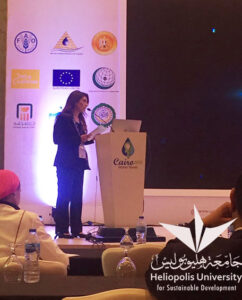 The session aimed to emphasize the role of communities in linking education with applied scientific research, industry, and community service and adopt water, energy and food security methodology at all levels of education, innovation, and research to ensure sustainable development.
The session aimed to emphasize the role of communities in linking education with applied scientific research, industry, and community service and adopt water, energy and food security methodology at all levels of education, innovation, and research to ensure sustainable development.
The session was initiated by Dr. Rasha Al-Kholy who introduced the role of Heliopolis University in raising awareness about research and application. Prof. Sewilam then presented the experience of the American University in Cairo (AUC) with MSc and PhD. students using the osmosis system and the multiple applications that made use of the output in agriculture.
Also Prof. Abu-Hadid spoke about Egypt’s crisis in regard to irrigation water, the climate changes in the Delta area, and the excessive irrigation in some areas. Dr. El Khayat reviewed Egypt’s sustainable energy strategy and its pilot projects. As for Dr. Shawky, he talked about the scientific and research development achieved for the local manufacturing of desalination units and membranes and the use of mobile units for remote areas.
The Faculty of Engineering team then started their speeches. Dr.Tamer El Gohary, Dr. Heba Mosallam, and Dr. Amr Sobhy shed the light on three projects the Faculty of Engineering is currently working on. The first project is to connect water and energy systems following Egypt’ strategies, and to implement the first experimental aquaponics using hydroponics, desalination of groundwater, solar energy, and fish farming. The second project is the use of wastewater in incubation and generation of algae to make therapeutic medications. The third is lifting water in lakes using solar energy.
The main issues discussed were:
– Reducing energy used in reverse osmosis by applying forward osmosis.
– Using agricultural cropping systems to reduce evaporation from irrigation and increasing productivity of the same areas if traditional methods of irrigation were used.
– Using renewable energy is insufficient to reduce fuel consumption but to implement energy efficiency in all buildings.
– Enhancing training programs and raising awareness are the primary responsibility of different governmental sectors.
– Manufacturing of some parts of desalination plants is the coming challenge to overcome water and energy scarcity.
The Faculty of Engineering team including Nesma Rashwan and Mustafa Osama participated in organizing the conference sessions, receiving guests from different ministries and embassies of Arab and foreign countries, and attending lectures.
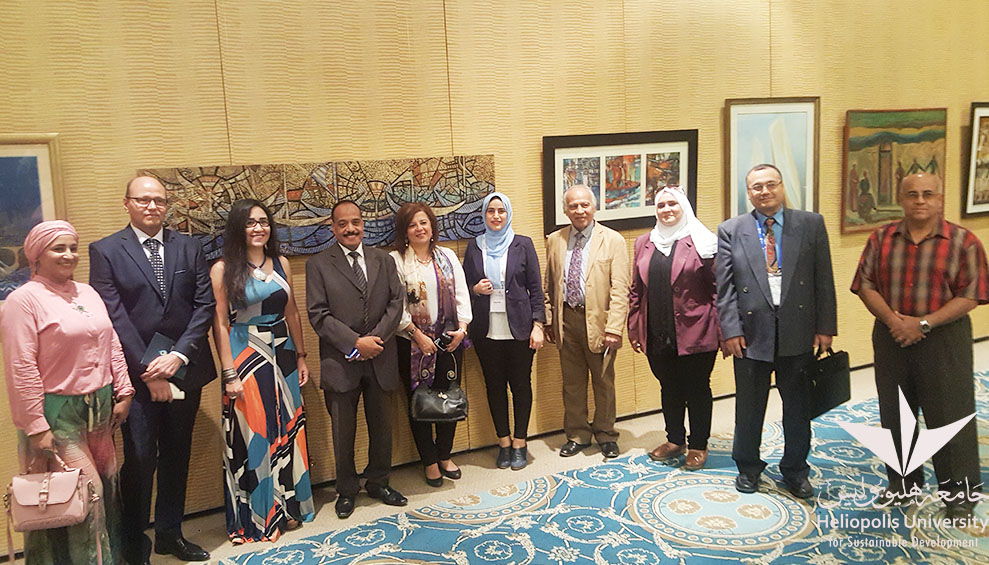
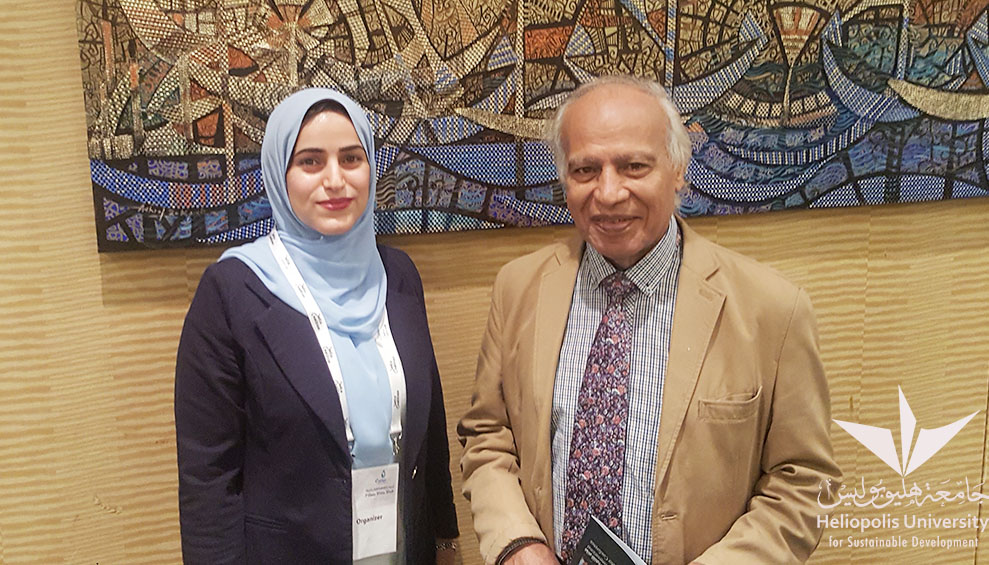
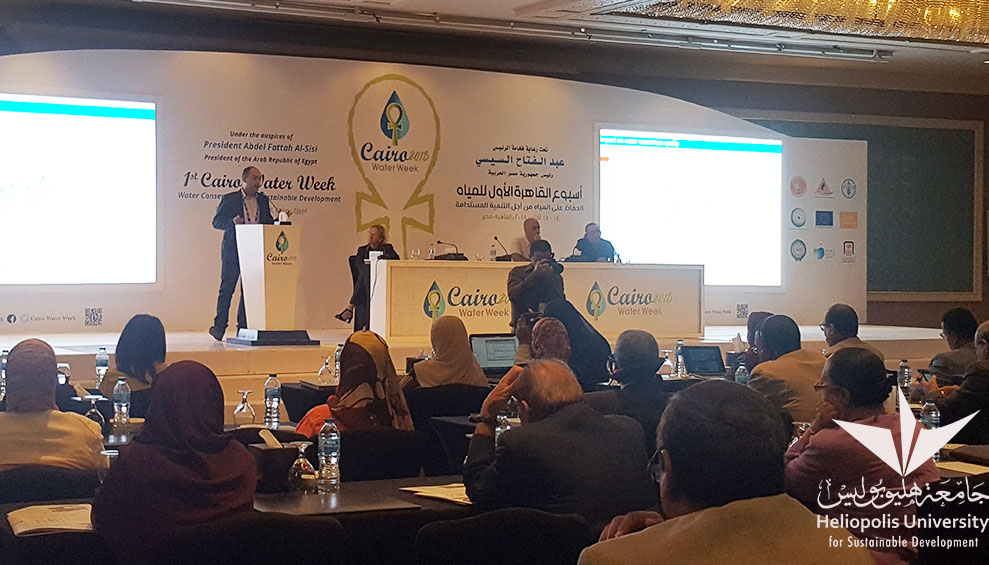
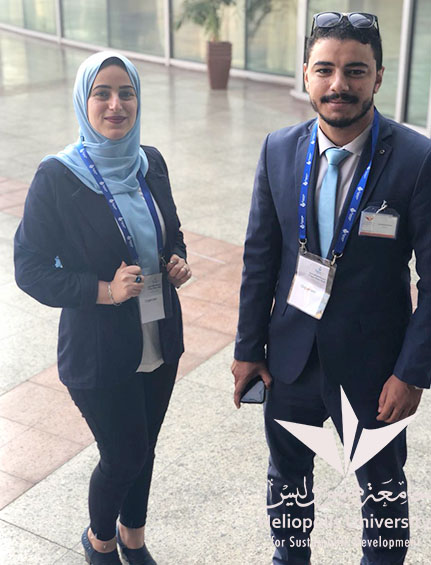
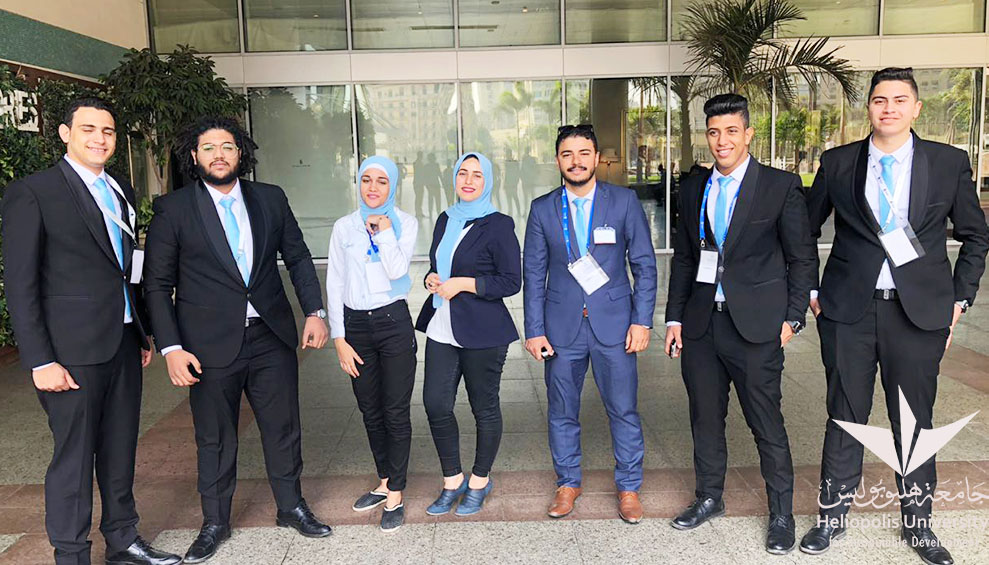
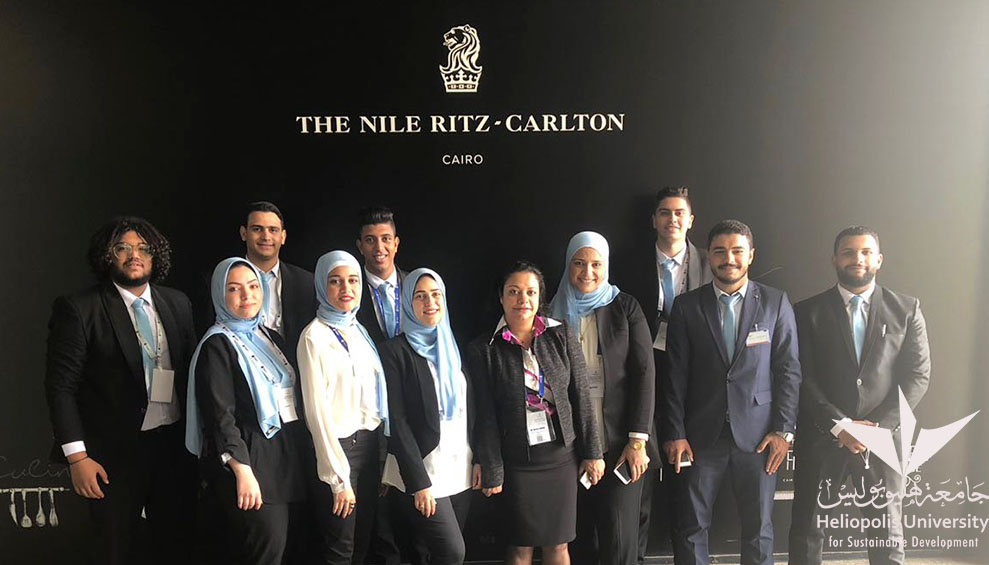
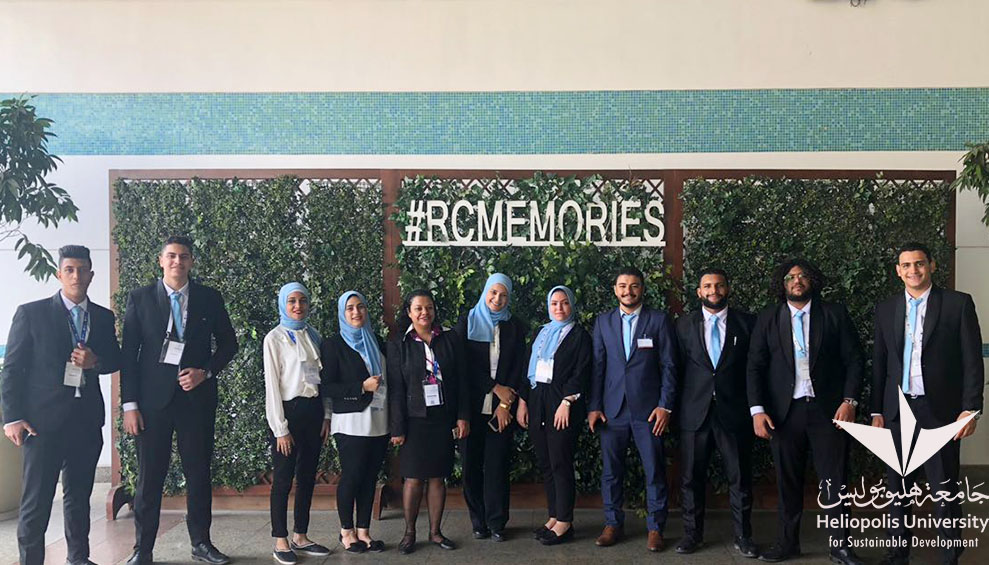
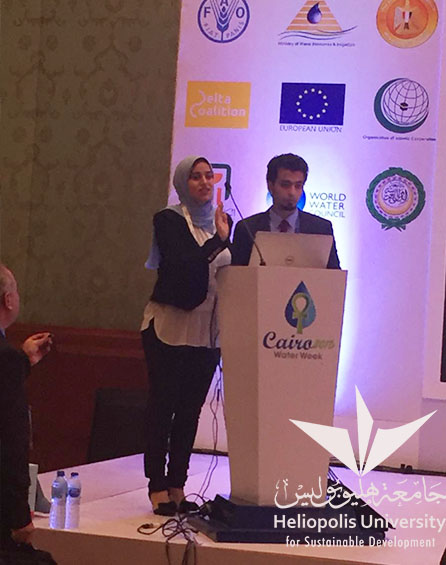
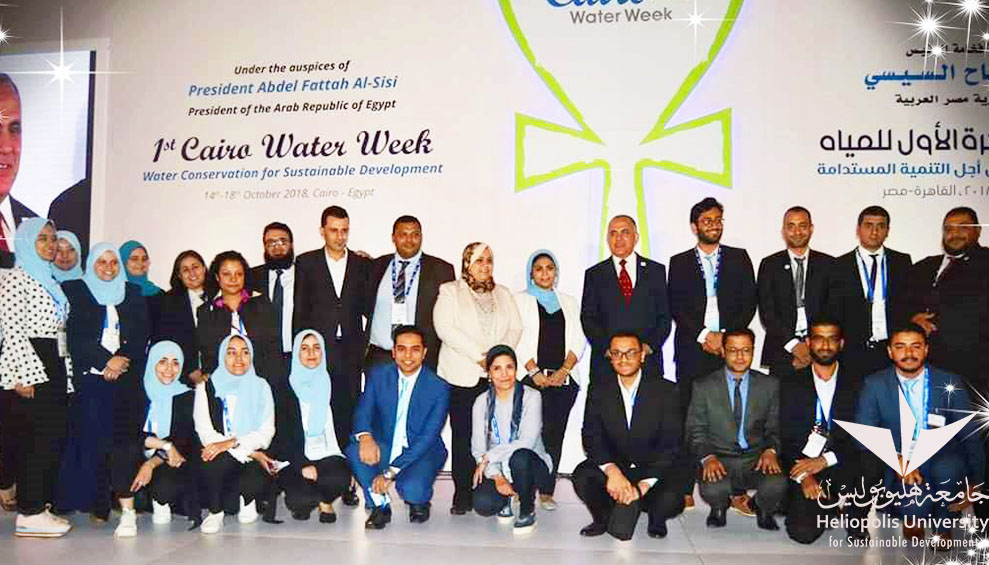
[:ar]
 قامت جامعه هليوبوليس للتنمية المستدامة بالتنسيق مع وزارة الموارد المائية والري بعقد جلسة مميزة ضمن فعاليات أسبوع القاهرة الأول للمياه عن منظومة المياه والغذاء والطاقة.
قامت جامعه هليوبوليس للتنمية المستدامة بالتنسيق مع وزارة الموارد المائية والري بعقد جلسة مميزة ضمن فعاليات أسبوع القاهرة الأول للمياه عن منظومة المياه والغذاء والطاقة.
وقد ترأست الجلسه أ.د رشا الخولى – نائب رئيس جامعة هليوبوليس وعميد كليه الهندسة وكانت من أبرز المتحدثين. كما شارك في الجلسة أ.د. هاني سويلم –مدير كرسي اليونسكو الجامعي للمياه و ورئيس قسم الهندسة الهيدروليكية في جامعة آخن بألمانيا وعضو مجلس أمناء جامعة هليوبوليس و أ.د. أيمن أبوحديد – وزير الزراعة الأسبق و أ.د. محمد الخياط – رئيس هيئة الطاقة الجديدة والمتجددة و أ.د. حسام شوقى – مدير مركز بحوث تحلية المياه.
تم في البداية عرض أهداف الجلسة وكانت كالآتي:
- الـتأكيد على دور المجتمعات في ربط التعليم بالبحث العلمي التطبيقي والصناعة وخدمة المجتمع.
- اعتماد منهجية المياه والطاقة والأمن الغذائي على جميع المستويات التعليمية والابتكارية والأبحاث لضمان التنمية المستدامة.
وقد استهلت الجلسه د. رشا الخولي بدور جامعة هليوبوليس في رفع مستوى الوعي بالبحث والتطبيق ، ثم تحدث د. هاني سويلم عن تجربة الجامعة الأمريكية بالقاهرة مع طلاب الماجستير والدكتوراه باستخدام نظام التناضح الأمامي والتطبيقات المتعددة من أجل استخدام الناتج في الزراعة.
 كما تحدث د. أبوحديد عن مشاكل مصر في مياه الري وأزمة التغير المناخي في مناطق الدلتا والإفراط في الري في بعض المناطق ثم تحدث د. الخياط عن استراتيجية الطاقة المستدامة في مصر واستعراض المشاريع الرائدة. أما د. شوقي فقد تحدث عن التطور العلمي والبحثي في التصنيع المحلي لوحدات التحلية والأغشية المحلية واستخدام الوحدات المتنقلة للمناطق النائية.
كما تحدث د. أبوحديد عن مشاكل مصر في مياه الري وأزمة التغير المناخي في مناطق الدلتا والإفراط في الري في بعض المناطق ثم تحدث د. الخياط عن استراتيجية الطاقة المستدامة في مصر واستعراض المشاريع الرائدة. أما د. شوقي فقد تحدث عن التطور العلمي والبحثي في التصنيع المحلي لوحدات التحلية والأغشية المحلية واستخدام الوحدات المتنقلة للمناطق النائية.
وقد تلى المتحدثين الخارجيين فريق عمل كليه الهندسة بالجامعة وهم د. تامر الجوهري ود. هبة مسلم ود. عمرو صبحي ليلقوا الضوء على ثلاثة مشاريع رائدة تنفذها الكلية أولها عن ربط منظومة المياه والطاقة في ضوء استراتجيات الدولة وتنفيذ أول اكوابونيكس تجريبية للاستزراع بدون تربة وبتحلية مياه جوفية باستخدام الطاقة الشمسية مع الاستزراع السمكي وثانيها استخدام ناتج المياه العادمة في تحضين وتوليد الطحالب والتي تستخدم في الأدويه العلاجية فائقة الجودة وكأعلاف سمكية وثالثهما عن رفع المياه السطحية في البحيرة باستخدام الطاقة الشمسية.
ومن أهم قضايا النقاش:
– تقليل الطاقة المستخدمة في التناضح العكسي عن طريق تطبيق التناضح الأمامي.
– استخدام نظام الصوب الزراعية في المحاصيل لتقليل التبخر الناتج عن الري وزيادة إنتاجية المناطق نفسها عن استخدام الطرق التقليدية للري.
– إن استخدام الطاقة المتجددة لا يكفي لتقليل استهلاك الوقود الأحفوري ولكن لتنفيذ كفاءة الطاقة في جميع المباني.
– زيادة التدريب والتوعية هي المسئولية الأساسية للقطاعات الحكومية المختلفة.
– سيكون التصنيع المحلي في أجزاء محطات تحلية المياه هو التحدي القادم للتغلب على ندرة المياه والطاقة.
أما بالنسبة للرسائل الرئيسية للجلسة:
– الابتكار في أساليب وتكنولوجيا تحلية المياه.
– التصنيع المحلي لوحدات تحلية المياه.
– تعزيز وتحسين نظام الري.
– أبحاث طرق التحكم في البخر الزراعي.
– دعم المشروعات الصغيرة. بالإضافة إلى تسهيل عمليات التصنيع المحلية واستبدال المنتجات المصرية بدلاً من الاستيراد في السوق كنهج مختلف للقطاعات الحكومية المصرية.
وقد ساهم فريق من طلبة كلية الهندسة يترأسهم المهندسة نسمة رشوان و المهندس مصطفى أسامة في تنظيم المؤتمر واستقبال الضيوف من الوزراء و سفراء الدول الأخري العربية و الأجنبية وكذلك حضور المحاضرات والجلسات المختلفة وتوقيع الاتفاقيات.









[:]


